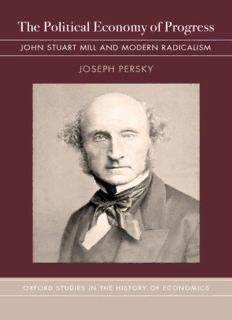
The political economy of progress : John Stuart Mill and modern radicalism PDF
Preview The political economy of progress : John Stuart Mill and modern radicalism
The Political Economy of Progress OXFORD STUDIES IN THE HISTORY OF ECONOMICS Series Editor: Steven G. Medema, University of Colorado, Denver This series publishes leading- edge scholarship by historians of econom- ics and social science, drawing upon approaches from intellectual history, the history of ideas, and the history of the natural and social sciences. It embraces the history of economic thinking from ancient times to the present, the evolution of the discipline itself, the relationship of econom- ics to other fields of inquiry, and the diffusion of economic ideas within the discipline and to the policy realm and broader publics. This enlarged scope affords the possibility of looking anew at the intellectual, social, and professional forces that have surrounded and conditioned economics’ continued development. The Political Economy of Progress John Stuart Mill and Modern Radicalism xwx Joseph Persky 1 1 Oxford University Press is a department of the University of Oxford. It furthers the University’s objective of excellence in research, scholarship, and education by publishing worldwide. Oxford is a registered trade mark of Oxford University Press in the UK and certain other countries. Published in the United States of America by Oxford University Press 198 Madison Avenue, New York, NY 10016, United States of America. © Oxford University Press 2016 All rights reserved. No part of this publication may be reproduced, stored in a retrieval system, or transmitted, in any form or by any means, without the prior permission in writing of Oxford University Press, or as expressly permitted by law, by license, or under terms agreed with the appropriate reproduction rights organization. Inquiries concerning reproduction outside the scope of the above should be sent to the Rights Department, Oxford University Press, at the address above. You must not circulate this work in any other form and you must impose this same condition on any acquirer. CIP data is on file at the Library of Congress ISBN 978– 0– 19– 046063– 1 1 3 5 7 9 8 6 4 2 Printed by Sheridan, USA To Victoria, We are well met. CONTENTS Acknowledgments ix Prologue: Modern Radicalism and Mill xi PART I: The Utilitarian Reading of Accumulation 1. Antecedents 3 2. The Greatest Happiness of the Greatest Number 26 3. Bentham’s Liberal Triumphalism 42 4. Utilitarian Perspectives on Private Property 55 5. Mill’s Radical Case for Laissez- Faire Capitalism 72 PART II: Progress and Radical Reform 6. Inheritance and Land 91 7. Poverty, the Poor Laws, and the Family 109 8. The Education of the Working Classes 122 9. Cooperatives, Unions, and Economic Democracy 133 PART III: Echoes 10. Marx and Mill 155 11. The Fabians, Early and Late 169 12. Rawls and the Means of Production 184 13. Radical Luck 199 Mill’s Vision 217 Bibliography 221 Index 233 ( vii ) ACKNOWLEDGMENTS Various parts of this work have benefited greatly from comments by colleagues. A warm acknowledgment goes to the regular members of the informal Chicago History of Economics group: John Berdell, Steve Engelmann, Sam Fleischacker, and Deirdre McCloskey. I have gained much from their insightful discussions of several chapters. Core chapters have also benefited from comments by participants in the last several History of Economics Society annual meetings, including Charalampos Konstantinidis and Margaret Schabas. Two chapters here reflect the sub- stantial input of Tim Taylor, who puts in yeoman service as the managing editor of the Journal of Economic Perspectives and institutional guardian of the Retrospectives feature there. The entire manuscript has been carefully read by Steve Medema, who went well beyond the duties of a series editor in helping me digest various arguments, including several with which he surely doesn’t agree. And, thanks to Scott Parris who, as economics edi- tor for Oxford University Press, allowed me— indeed, encouraged me— to move past Mill as a nineteenth- century figure and to consider his continu- ing influence in modern political economy and political philosophy. Five of the following chapters are based on earlier publications, although in several cases with substantial rethinking. Chapter 7, “Poverty, the Poor Laws, and the Family,” draws on “Classical Family Values: Ending the Poor Laws as They Knew Them,” in the Journal of Economic Perspectives 11, no. 1 (1997). Chapter 3 on Bentham first appeared as “From Usury to Interest,” also in the Journal of Economic Perspectives 21, no. 1 (2007). Chapter 4, “Utilitarian Perspectives on Private Property,” was published with a somewhat different thesis as “On the Thinness of Utilitarian Defenses of Private Property,” in the Journal of the History of Economic Thought 32, no. 1 (2010). Chapter 12, “Rawls and the Means of Production,” grows out of “Rawls’s Thin (Millean) Defense of Private Property,” in Utilitas 22, no. 2 (2010). Finally, c hapter 13, “Radical Luck,” first saw the light of day as “Utilitarianism and Luck,” in History of Political Economy 45, no. 2 (2013). ( ix )
Description: